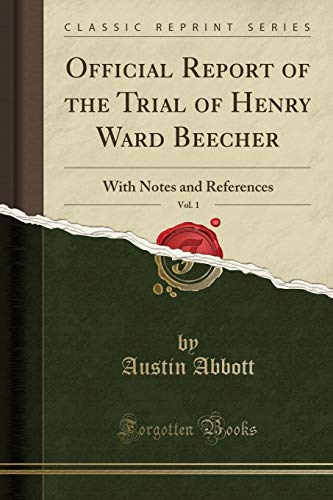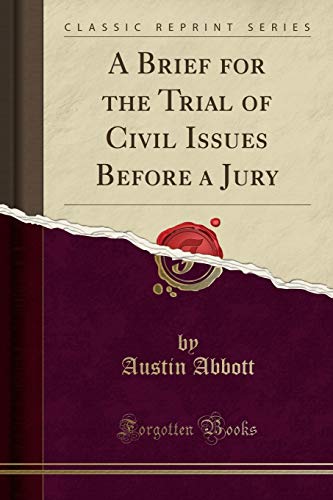Background
Austin Abbott was born on December 18, 1831 at Boston, Massachusetts, United states, the second son of Jacob Abbott and brother of Benjamin Vaughan Abbott, Edward Abbott, and Lyman Abbott.



(Excerpt from Official Report of the Trial of Henry Ward B...)
Excerpt from Official Report of the Trial of Henry Ward Beecher, Vol. 1: With Notes and References The report presents the most intelligible, accurate, and complete account of this remarkable case. The arguments of counsel and the notes of the editor, it is believed, embody all that is important to the professional reader, in respect to the trial of the question of adultery in actions of this nature or in proceedings for divorce, and they also present unrivaled models of the art of examination and cross-examination, and discussions of questions of 714195 prius evidence, of almost every kind, by the most eminent advocates of the country, aided by all the resources of legal research. About the Publisher Forgotten Books publishes hundreds of thousands of rare and classic books. Find more at www.forgottenbooks.com This book is a reproduction of an important historical work. Forgotten Books uses state-of-the-art technology to digitally reconstruct the work, preserving the original format whilst repairing imperfections present in the aged copy. In rare cases, an imperfection in the original, such as a blemish or missing page, may be replicated in our edition. We do, however, repair the vast majority of imperfections successfully; any imperfections that remain are intentionally left to preserve the state of such historical works.
https://www.amazon.com/Official-Report-Trial-Henry-Beecher/dp/0259952176?SubscriptionId=AKIAJRRWTH346WSPOAFQ&tag=prabook-20&linkCode=sp1&camp=2025&creative=165953&creativeASIN=0259952176

(Excerpt from A Brief for the Trial of Civil Issues Before...)
Excerpt from A Brief for the Trial of Civil Issues Before a Jury Space has not allowed a full statement of the statutes and rules of court of other jurisdictions than New York; but I trust that I have indicated the existence of such statutes in such a way that the intelligent practitioner in any jurisdiction cannot be misled. In making up a list of Useful Authorities on Evidence (division I have not confined myself to stating what I deem to be settled law, deem ing it there more useful to index concisely the best authorities, including some debatable points, rather than to take space to state each rule at length. About the Publisher Forgotten Books publishes hundreds of thousands of rare and classic books. Find more at www.forgottenbooks.com This book is a reproduction of an important historical work. Forgotten Books uses state-of-the-art technology to digitally reconstruct the work, preserving the original format whilst repairing imperfections present in the aged copy. In rare cases, an imperfection in the original, such as a blemish or missing page, may be replicated in our edition. We do, however, repair the vast majority of imperfections successfully; any imperfections that remain are intentionally left to preserve the state of such historical works.
https://www.amazon.com/Brief-Issues-Before-Classic-Reprint/dp/0282040331?SubscriptionId=AKIAJRRWTH346WSPOAFQ&tag=prabook-20&linkCode=sp1&camp=2025&creative=165953&creativeASIN=0282040331
Austin Abbott was born on December 18, 1831 at Boston, Massachusetts, United states, the second son of Jacob Abbott and brother of Benjamin Vaughan Abbott, Edward Abbott, and Lyman Abbott.
Abbott early education was obtained at Boston and at Roxbury, Massachussets, and Farmington, Maine.
He became a student at New York University in 1847, where he graduated with high honors in 1851, delivering the English oration on that occasion.
He then studied law, received a Doctor of Law degree in 1851 and was admitted to the bar of New York City in 1852.
Early in career Abbott commenced legal practice in New York City in partnership with Benjamin Vaughan Abbott under the firm name of "Abbott Brothers. "
Of his earliest literary efforts, two works of fiction, Cone Cut Corners; the Experiences of a Conservative Family in Fanatical Times (1855) and Matthew Caraby (1859), were written in collaboration with his brothers, Benjamin and Lyman, and published under the pseudonym "Benauly. "
In 1855 Austin and Benjamin jointly prepared the first volume of a series of Reports of Practice Cases Determined in the Courts of the State of New York, and thereafter for fifteen years, working in collaboration, produced legal text-books, reports, and digests, notable for variety, accuracy, scientific arrangement, and utility.
During all this period Abbott continued in active practice and acquired a reputation for exceptional knowledge of legal principles combined with consistent untiring application. In 1865 he assisted the commissioners in preparing the codes of New York State.
On the retirement of Benjamin Vaughan Abbott from the firm he practiced alone, and, after 1870, the brothers ceased to collaborate. Austin Abbott's first independent effort was Reports of Decisions of the Court of Appeals of New York, 1850-1869 in four volumes (1873-1874), followed by the first volume of New Cases, Courts of the State of New York (1877), which ultimately extended to thirty-one volumes, covering the period 1876-1894, the last volume appearing in 1894. He prepared a new edition of Abbott's Digest of New York Statutes and Reports in six volumes (1873), which he kept up to date by eight supplements, the last of which appeared in 1896. He published in 1880 Trial Evidence, The Rules of Evidence Applicable on the Trials of Civil Actions. Then in succession he wrote a series of "Briefs, " material for which he had been accumulating for years: Brief for the Trial of Civil Issues before a Jury (1885), The Principles and Forms of Practice in Civil Actions (1887-1888), and other, all of which obtained a wide circulation which was not confined to New York state. Supplementing these, he compiled Select Cases on Code Pleading (1893) and Select Cases on the Law of Evidence as Applied During the Examination of Witnesses (1895), thus completing his texts on the incidents of trials.
He was retained in much heavy litigation, appearing in many notable cases. He was of government counsel in the prosecution of Guiteau for the assassination of President Garfield, and held a brief in the action brought by Madison Avenue Congregational Church, New York, which resulted in the ejection of Bishop Newman from its pastorate. He was of counsel for the defense in Tilton vs. Beecher, and his success in this celebrated case procured for him a national reputation. A lawyer's lawyer, as it was termed, his advice was frequently sought in conference by other members of the bar when they were faced with serious difficulties.
In 1891 he accepted the position of dean of the Law School of the University of New York with the professorship of Pleading, Equity, and Evidence. He altered the curriculum, making the courses less academic and more practical, instilled new vigor into the teaching, and materially raised the standard of the school.
He died in New York City, April 19, 1896. At the time of his death he had in preparation Forms of Pleadings in Actions, which was completed by C. C. Alden.
(Excerpt from A Brief for the Trial of Civil Issues Before...)
(Excerpt from Official Report of the Trial of Henry Ward B...)
Abbott was tall of stature, slender in physique, unobtrusive, and somewhat nervous in manner, a man of "undeviating integrity and lofty sense of duty" always interested in philanthropic movements.
Abbott was married twice, in 1854 to Ellen Louise Dummer Gilman, and in 1879 to Mrs. Anna Rowe Worth.
